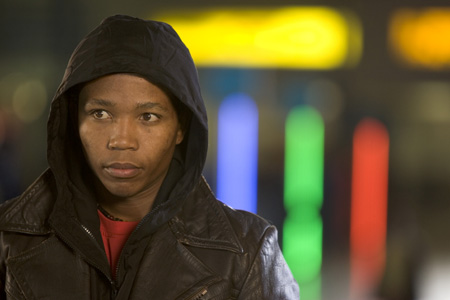|
Reviews of Recent Independent, Foreign, & Documentary Films in Theaters and DVD/Home Video
Directed & Written by: Gavin Hood, based on the novel by Athol Fugard. Produced by: Peter Fudakowski. Director of Photography: Lance Gewer. Edited by: Megan Gill. Music by: Mark Kilian & Paul Hepker. Released by: Miramax. Language: Zulu/Xhosa/Afrikaans with English subtitles. Country of Origin: UK/South Africa. 94 min. Rated: R. With: Presley Chweneyagae, Terry Pheto, Kenneth Nkosi, Mothusi Magano & Zenzo Ngqobe.
Four black teenagers eye an easy mark at a train station: an elderly black man in his Sunday best.
Following the man into a crowded subway car, they huddle around him. Three of the youths, taking their cue from ringleader Tsotsi (Presley Chweneyagae),
lean against the man as one of them, Butcher (Zenzo Ngqobe), pulls out an ice pick and jabs the man in the heart. They abscond with the man’s wallet, fleeing the car as it empties out, leaving the man dead on the floor. The killing is as shocking to the audience as it is to Boston (Mothusi Magano), a reluctant member of the gang.
After rounds of beer at the local dive, he calls out the stone-faced Tsotsi, not believing anyone could be so heartless. His flinty stare boring down hard on Boston, Tsotsi springs forward without saying a word, beating Boston’s face to a pulp. Ostracized by his friends and kicked out of the bar, Tsotsi runs from the scene to a leafy, high-security suburb. Spying a car, he shoots the young female driver point blank. He’s startled to hear a cry while driving away, and finds a newborn baby in the backseat staring back at him. After all this in the powerful 15-minute opening, it’s a long road ahead to redemption.
With a baby’s life in jeopardy, Tsotsi was likely the most suspenseful submission for this year’s foreign language Oscar (Paradise Now’s suicide bombers a close second). A less sympathetic character than any of City of God’s street kids, the orphaned Tsotsi has worked his way up from living in concrete tunnels as a boy. Tsotsi, slang for gangster, lives up to his name in his black leather jacket, choker collar and scars in the back of his head. Slightly built, the 19-year-old could easily pass for 14.
Wisely, it’s taken for granted that the viewer will be generally aware of recent South African history. Filmed on location, a bulletin board with the message, “We are all affected by AIDS & HIV,” is about as overt a commentary as it gets. The black-on-black crime adds just one of the layers to Tsotsi’s convoluted view of contemporary South Africa. The cops pursuing the shooting/kidnapping are white, black, and South Asian, not one necessarily a more moral cop than the other. The affluence of Tsotsi’s black victims, the infant’s parents, harshly contrasts with the poverty of Tsotsi’s shantytown, where most of the film takes place. And the one person confronting Tsotsi for almost killing Boston runs the local bar, selling booze to her mostly underemployed male clientele and the occasional prostitute.
But the same complexity cannot be said for the plot. Against the vivid backdrop, it’s only a matter of when – not if – Tsotsi’s rigid façade will crumble and he will feel an emotion other than anger. Not once during the film’s three-act narrative is there the precise moment when his perception changes. Instead, through a series of cumulative events, Tsotsi thaws – a baby needs to be change and fed, after all – making his coming of age general and drawn out.
Kent Turner
|
